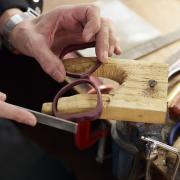We live in a disposable society. After all, with superstores selling cheap electronic goods it's often easier to buy a new toaster or kettle than to mend a faulty one. So what has happened to the traditional repair man?
EVEN as a lad of 11, back in the late '60s, David Young loved tinkering with old radios and toasters. It was a fascination that propelled him down to his local electrical stores, Sawyer's in Chalford Hill, to ask for a Saturday job - and he's been there ever since.
"When I left school at 17, I started working here full time. I used to have a line of appliances waiting to be repaired, and I'd work through them. Even as a boy, I loved taking things apart and putting them back together.
"In those days, you could get individual elements for toasters and kettles. No one ever thought about throwing things away. You only got rid of your television when it gasped its last - when the tube had gone."
Those were the days when a black and white set would cost you �300 - a not inconsiderable sum with an average weekly wage of around �12.
"If your TV went wrong, you'd probably get a �10 bill for putting it right, which was worth it."
Eighteen years ago, David took the business over and, on the surface, not much has changed.
You can still buy televisions, kettles and toasters here, though nowadays DVDs and digiboxes are among the appliances that have been added to the list. Customers still come in, as they always did, for that obscure sewing machine light bulb; for the electrical fitting that no one else seems to stock. Nor does David's workshop look particularly different: among the oscilloscopes and digital meters, the soldering iron remains king.
But the reason why the repair side keeps going at all is down to the attitude of his local customers - and in this day and age, they're a rare breed.
"Why we survive here is because we are in a village with a lot of elderly people who still like to see things mended," David says. "We do get some younger people in who've seen their parents come here; but on the whole, they go to Dixons, buy an appliance, and dispose of it when it goes wrong.
"To be perfectly honest, when I eventually finish here, I think this business will end."
Have a look round the electrical department of your nearest Tesco, and you'll begin to see why - if you haven't already discovered it for yourself. Why would you bother to mend a toaster that only cost �8 in the first place, or, indeed, a microwave for less than �24 - especially when that repair might cost more than buying another new one?
And then there's the hassle factor: the fag of having to take it along to your local repair shop - if you can find one - and doing without the gadget for a week. The principle doesn't just apply to broken appliances. When you can buy a printer for �19.99, is there any point in paying �12 for a replacement ink cartridge? Surely it's easier to ditch the lot and get a new one...
But even if you are prepared to buy an appliance for under a fiver and spend double that to mend it when it goes wrong, don't congratulate yourself on your green credentials just yet.
For when it comes to getting your cheap appliance mended, you might come unstuck - unlike your cheap appliance. Many of them are glued together or fitted with slip screws that you can tighten but not undo. And for others, the spare parts are simply unobtainable.
"At one time, I was able to say to nearly everyone with a broken appliance, 'Yes, no problem; bring it in and I'll have a look at it for you'," David says. "Now I'm having to explain to people that I can't repair certain things.
"It's not just a case of not being able to get the parts. I could repair 98 percent of older television sets, but half of the flat screens need specialist equipment and have to be sent back to the manufacturers."
The current waste figures for electrical items are shocking. Around six million appliances are dumped in the UK every year, and for every item that's scrapped, a new one is bought - an over-consumption that also has its effects. According to Friends of the Earth the average television contains around five kilograms of metals of which the mining and processing will have generated a quarter of a tonne of waste.
Up until recently, no particular sector of the electrical industry had to take responsibility for the growing mountains of waste. But all that is changing with the implementation, last month, of a new EC directive: Waste Electrical and Electronic Equipment. Manufacturers and retailers are being allotted quotas, based on their share of the market, which oblige them to play a part in the recycling, where possible, of electrical and electronic equipment.
From now on, if you buy a new toaster, the retailer is obliged to give you an option for disposing of any old one. It may be they will take it themselves; or they might give you details of a local site where it will be reused or recycled.
Fears have been mooted that this will send the cost of goods rocketing, but in Germany, where the scheme is up and running, price increases passed to the customer have so far been marginal.
A similar initiative for mobile phones has already proved successful. At one time, 40 percent of lead in soil came from scrapped mobiles. Today, instead of being thrown away, most are upgraded or even reused in Third World countries.
But not everyone is convinced the scheme will make a difference. Eric Wall and his brother, Clive, work in the Minchinhampton electrical sales and repair shop, F.A Wall, that their father, Frank, founded in 1957. "I'd like to think this will persuade companies to manufacture recyclable and repairable goods such as toasters, but I doubt it," Eric says. Out of all of his shelves, he can only point to a single toaster that's still made in Britain. The good news is that this solid Dualit is easily repairable and will soldier on ad infinitum. The bad news? It retails at more than �100. "It's the age-old problem," he says. "A lot of people don't want to spend that much on a toaster.
"The interesting thing is, when a Morphy Richards cost 20 guineas, that was the equivalent of two or three weeks' wages. Proportionately, a new toaster should now cost more than �100.
"Another good example is colour televisions. In the late 1960s, they were so valuable that manufacturers actually couldn't insure them for delivery. We fetched the first one we ever sold in a brand new van that cost less than the television we were collecting!
"But all that has changed. Last Christmas, Tesco were selling a toaster, made in China, for �4.99. Their most expensive loaf was �3.99: that's how bonkers it is."
Not only does Eric Wall have little faith in the new recycling law - he thinks it could even make things worse. "It's hard to work out how a plastic kettle can be recycled. And I certainly can't see that manufacturers are going to pay to ship materials back to China for recycling - it doesn't make economic sense," he says.
"The supermarkets will continue to sell cheap goods because they're straight loss leaders."
Unlike the politicians who formulate the law, he doesn't believe it will sort out the growing problem of waste. In fact, in the long run, he thinks it will make matters worse.
"Sooner or later, I believe the cost of disposing of electrical goods will fall onto the consumer," he says. "That won't mean that people will get things mended; it will simply mean they won't take them to the tip. Instead, I can see more and more unwanted TVs and DVD players being thrown into ditches."
David Young couldn't agree more. "At the moment, appliances are disposed of within three to four years, whereas you would have been looking at a life of around 15 years before.
"The law needs to focus on the source of all this. If manufacturers made things like they used to - able to be repaired and at an economical price - there wouldn't be such a problem in the first place."
EVEN as a lad of 11, back in the late '60s, David Young loved tinkering with old radios and toasters. It was a fascination that propelled him down to his local electrical stores, Sawyer's in Chalford Hill, to ask for a Saturday job - and he's been there ever since.
"When I left school at 17, I started working here full time. I used to have a line of appliances waiting to be repaired, and I'd work through them. Even as a boy, I loved taking things apart and putting them back together.
"In those days, you could get individual elements for toasters and kettles. No one ever thought about throwing things away. You only got rid of your television when it gasped its last - when the tube had gone."
Those were the days when a black and white set would cost you �300 - a not inconsiderable sum with an average weekly wage of around �12.
"If your TV went wrong, you'd probably get a �10 bill for putting it right, which was worth it."
Eighteen years ago, David took the business over and, on the surface, not much has changed.
You can still buy televisions, kettles and toasters here, though nowadays DVDs and digiboxes are among the appliances that have been added to the list. Customers still come in, as they always did, for that obscure sewing machine light bulb; for the electrical fitting that no one else seems to stock. Nor does David's workshop look particularly different: among the oscilloscopes and digital meters, the soldering iron remains king.
But the reason why the repair side keeps going at all is down to the attitude of his local customers - and in this day and age, they're a rare breed.
"Why we survive here is because we are in a village with a lot of elderly people who still like to see things mended," David says. "We do get some younger people in who've seen their parents come here; but on the whole, they go to Dixons, buy an appliance, and dispose of it when it goes wrong.
"To be perfectly honest, when I eventually finish here, I think this business will end."
Have a look round the electrical department of your nearest Tesco, and you'll begin to see why - if you haven't already discovered it for yourself. Why would you bother to mend a toaster that only cost �8 in the first place, or, indeed, a microwave for less than �24 - especially when that repair might cost more than buying another new one?
And then there's the hassle factor: the fag of having to take it along to your local repair shop - if you can find one - and doing without the gadget for a week. The principle doesn't just apply to broken appliances. When you can buy a printer for �19.99, is there any point in paying �12 for a replacement ink cartridge? Surely it's easier to ditch the lot and get a new one...
But even if you are prepared to buy an appliance for under a fiver and spend double that to mend it when it goes wrong, don't congratulate yourself on your green credentials just yet.
For when it comes to getting your cheap appliance mended, you might come unstuck - unlike your cheap appliance. Many of them are glued together or fitted with slip screws that you can tighten but not undo. And for others, the spare parts are simply unobtainable.
"At one time, I was able to say to nearly everyone with a broken appliance, 'Yes, no problem; bring it in and I'll have a look at it for you'," David says. "Now I'm having to explain to people that I can't repair certain things.
"It's not just a case of not being able to get the parts. I could repair 98 percent of older television sets, but half of the flat screens need specialist equipment and have to be sent back to the manufacturers."
The current waste figures for electrical items are shocking. Around six million appliances are dumped in the UK every year, and for every item that's scrapped, a new one is bought - an over-consumption that also has its effects. According to Friends of the Earth the average television contains around five kilograms of metals of which the mining and processing will have generated a quarter of a tonne of waste.
Up until recently, no particular sector of the electrical industry had to take responsibility for the growing mountains of waste. But all that is changing with the implementation, last month, of a new EC directive: Waste Electrical and Electronic Equipment. Manufacturers and retailers are being allotted quotas, based on their share of the market, which oblige them to play a part in the recycling, where possible, of electrical and electronic equipment.
From now on, if you buy a new toaster, the retailer is obliged to give you an option for disposing of any old one. It may be they will take it themselves; or they might give you details of a local site where it will be reused or recycled.
Fears have been mooted that this will send the cost of goods rocketing, but in Germany, where the scheme is up and running, price increases passed to the customer have so far been marginal.
A similar initiative for mobile phones has already proved successful. At one time, 40 percent of lead in soil came from scrapped mobiles. Today, instead of being thrown away, most are upgraded or even reused in Third World countries.
But not everyone is convinced the scheme will make a difference. Eric Wall and his brother, Clive, work in the Minchinhampton electrical sales and repair shop, F.A Wall, that their father, Frank, founded in 1957. "I'd like to think this will persuade companies to manufacture recyclable and repairable goods such as toasters, but I doubt it," Eric says. Out of all of his shelves, he can only point to a single toaster that's still made in Britain. The good news is that this solid Dualit is easily repairable and will soldier on ad infinitum. The bad news? It retails at more than �100. "It's the age-old problem," he says. "A lot of people don't want to spend that much on a toaster.
"The interesting thing is, when a Morphy Richards cost 20 guineas, that was the equivalent of two or three weeks' wages. Proportionately, a new toaster should now cost more than �100.
"Another good example is colour televisions. In the late 1960s, they were so valuable that manufacturers actually couldn't insure them for delivery. We fetched the first one we ever sold in a brand new van that cost less than the television we were collecting!
"But all that has changed. Last Christmas, Tesco were selling a toaster, made in China, for �4.99. Their most expensive loaf was �3.99: that's how bonkers it is."
Not only does Eric Wall have little faith in the new recycling law - he thinks it could even make things worse. "It's hard to work out how a plastic kettle can be recycled. And I certainly can't see that manufacturers are going to pay to ship materials back to China for recycling - it doesn't make economic sense," he says.
"The supermarkets will continue to sell cheap goods because they're straight loss leaders."
Unlike the politicians who formulate the law, he doesn't believe it will sort out the growing problem of waste. In fact, in the long run, he thinks it will make matters worse.
"Sooner or later, I believe the cost of disposing of electrical goods will fall onto the consumer," he says. "That won't mean that people will get things mended; it will simply mean they won't take them to the tip. Instead, I can see more and more unwanted TVs and DVD players being thrown into ditches."
David Young couldn't agree more. "At the moment, appliances are disposed of within three to four years, whereas you would have been looking at a life of around 15 years before.
"The law needs to focus on the source of all this. If manufacturers made things like they used to - able to be repaired and at an economical price - there wouldn't be such a problem in the first place."


























